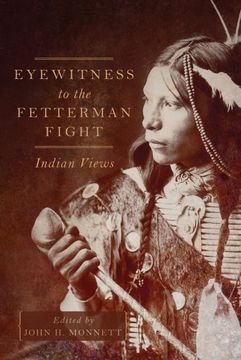Compartir
Eyewitness to the Fetterman Fight: Indian Views (en Inglés)
John H. Monnett- (Autor)
·
University Of Oklahoma Press
· Tapa Blanda
Eyewitness to the Fetterman Fight: Indian Views (en Inglés) - John H. Monnett-
$ 680.50
$ 1,237.27
Ahorras: $ 556.77
Elige la lista en la que quieres agregar tu producto o crea una nueva lista
✓ Producto agregado correctamente a la lista de deseos.
Ir a Mis Listas
Origen: Estados Unidos
(Costos de importación incluídos en el precio)
Se enviará desde nuestra bodega entre el
Lunes 10 de Junio y el
Viernes 21 de Junio.
Lo recibirás en cualquier lugar de México entre 1 y 3 días hábiles luego del envío.
Reseña del libro "Eyewitness to the Fetterman Fight: Indian Views (en Inglés)"
The Fetterman Fight ranks among the most crushing defeats suffered by the U.S. Army in the nineteenth-century West. On December 21, 1866—during Red Cloud’s War (1866–1868)—a well-organized force of 1,500 to 2,000 Oglala Lakota, Northern Cheyenne, and Arapaho warriors annihilated a detachment of seventy-nine infantry and cavalry soldiers—among them Captain William Judd Fetterman—and two civilian contractors. With no survivors on the U.S. side, the only eyewitness accounts of the battle came from Lakota and Cheyenne participants. In Eyewitness to the Fetterman Fight, award-winning historian John H. Monnett presents these Native views, drawn from previously published sources as well as newly discovered interviews with Oglala and Cheyenne warriors and leaders. Supplemented with archaeological evidence, these narratives flesh out historical understanding of Red Cloud’s War. Climate change in the mid-nineteenth century made the resource-rich Powder River Country in today’s Wyoming increasingly important to Plains Indians. At the same time, the discovery of gold in Montana encouraged prospectors to pass through the Powder River region on their way north, and so the U.S. Army began to construct new forts along the Bozeman Trail. In the resulting conflict, the Lakotas and Cheyennes defended their hunting ranges and trade routes. Traditional histories have laid the blame for Fetterman’s 1866 defeat and death on his incompetent leadership—and thus implied that the Indian alliance succeeded only because of Fetterman’s personal failings. Monnett’s sources paint another picture. Narratives like those of Miniconjou Lakota warrior White Bull suggest that Fetterman’s actions were not seen as rash or reprehensible until after the fact. Nor did his men flee the field in panic. Rather, they fought bravely to the end. The Indians, for their part, used their knowledge of the terrain to carefully plan and execute an ambush, ensuring them victory. Critical to understanding the nuances of Plains Indian strategy and tactics, the firsthand narratives in Eyewitness to the Fetterman Fight reveal the true nature of this Native victory against regular army forces.
- 0% (0)
- 0% (0)
- 0% (0)
- 0% (0)
- 0% (0)
Todos los libros de nuestro catálogo son Originales.
El libro está escrito en Inglés.
La encuadernación de esta edición es Tapa Blanda.
✓ Producto agregado correctamente al carro, Ir a Pagar.

